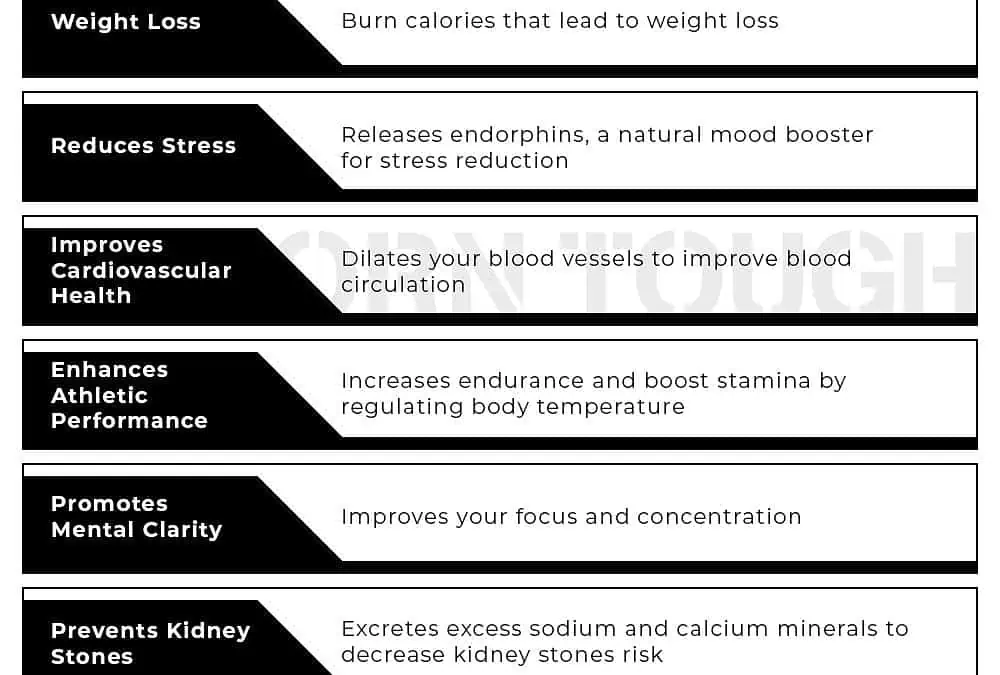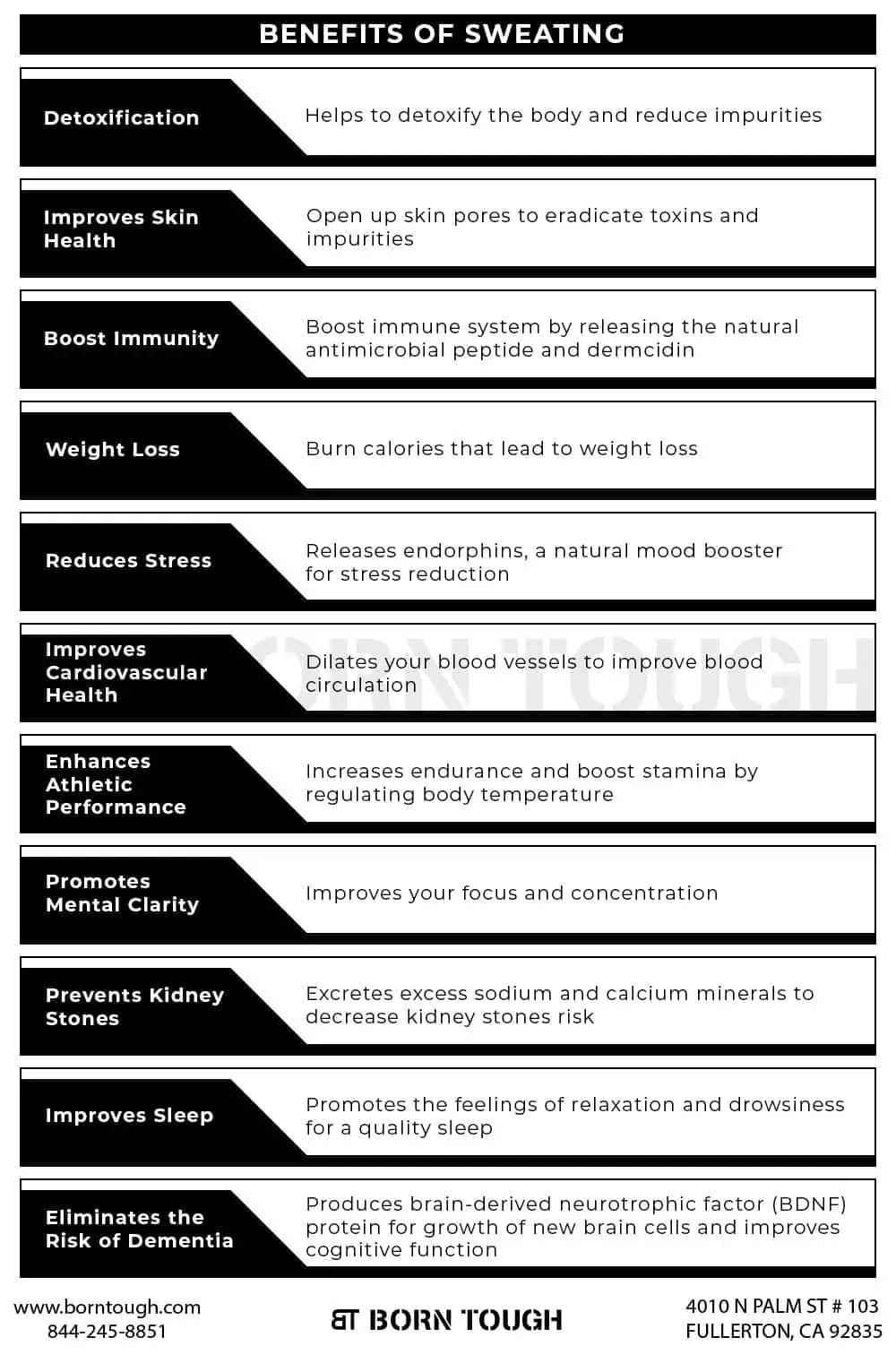
Is Sweating Good for You? 11 Surprising Benefits
Are you someone who dreads the idea of sweating? It can help if you rethink it. Sweat is more than just a byproduct of physical activity or heat; it’s a natural superpower that can work wonders for your health and well-being.
From detoxifying the body to improving your skin health, sweating offers many benefits that you need to be aware of. In this article, we’ll delve into the science of sweating and explore the rp1 surprising benefits that sweating can offer.
Table of Contents
1. The Science of Sweating
Sweating is an essential and natural function of the body that is designed to regulate your body temperature. It is mainly made of water but contains some minerals and waste products.
Interestingly, your body has millions of sweat glands all over your skin, but they are primarily concentrated in your palms, soles, forehead, and underarms.
1.1. Anatomy of Sweat Glands
Sweat glands are small, coiled tubular structures responsible for producing sweat. There are two types of sweat glands, eccrine and apocrine glands.
- First, eccrine glands are the most common sweat glands found all over your body. These glands regulate your body temperature by producing sweat, which evaporates from your skin and helps to cool you down.
- Second, apocrine glands are in your underarms and genital region. These glands are responsible for producing sweat-containing fatty acids and proteins. When this type of sweat mixes with bacteria on your skin, it can cause body odor.
“Sweating is like your body’s built-in air conditioning system, helping to regulate your temperature and keep you cool during physical activity.”
2. Process of Sweating
Sweating is initiated when your body temperature rises due to external and internal factors such as heat, exercise, or stress. As body temperature increases, it signals the sweat glands to produce sweat.
The produced sweat is released onto your skin through tiny openings called pores. As it evaporates from your skin, it helps to cool you down and regulate your body temperature.
3. Factors That Affect Sweating
Many factors affect sweating. They can range from physical activity to emotional stress. Here are some of the most critical factors which can cause sweating:
- Temperature & Humidity
- Age
- Gender
- Genetics
- Physical Activity
- Emotional & Mental Stress
- Certain Medical Conditions
- Medications
4. 11 Benefits of Sweating

Sweating has several essential benefits for your overall health and well-being. It is a natural function of the body that regulates your body temperature. Here, you can explore the benefits of sweating and how they contribute to your physical and mental health.
4.1. Detoxification

One of the most surprising benefits of sweating is its ability to detoxify your body. The skin is the largest organ in your body, and sweating is one of the ways that your body eliminates toxins.
As you sweat, you excrete toxins and impurities from your body, including heavy metals, pesticides, and other harmful chemicals.
4.2. Improves Skin Health

During sweating, your skin pores open up and release dirt and impurities. It can help to unclog pores and prevent acne and other skin blemishes. In short, you can wipe out all the impurities by sweating for healthy and glowing skin.
It helps to improve blood circulation and oxygen delivery to your skin, promoting cell growth and repair.
4.3. Boost Immunity

A great benefit of sweating is that it boosts your immune system. Your body releases a natural antimicrobial peptide called dermcidin when you are sweating. This peptide helps to fight off bacteria and viruses that prevent infections and illness.
4.4. Weight Loss

Sweating is vital to your body’s natural cooling process, especially during exercise. It can regulate your body temperature and keep it optimal for physical activity. It’s also thought to help the body burn calories more efficiently, aiding in weight loss. But did you know that sweating can also help with weight loss?
To get the most out of sweating for weight loss, try exercising in a hot or humid environment such as a sauna or steam room. Make sure you only do it in these environments, as excessive heat can be dangerous if not monitored properly.
You’ll be able to sweat even more than you would during regular exercise, which will cause your heart rate and metabolism to increase even further. Moreover, staying hydrated and replenishing electrolytes lost through sweating with water or sports drinks is important.
4.5. Reduces Stress

Sweating can reduce stress and anxiety. While sweating, your body releases endorphins that are natural mood boosters. These endorphins reduce stress and promote relaxation and well-being. Additionally, sweating can decrease cortisol levels, which is a hormone that is associated with stress.
4.6. Improves Cardiovascular Health

It can improve your cardiovascular health because sweat increases your heart rate. This may dilate your blood vessels which improve blood circulation. The gradual process can lower blood pressure and reduce the risk of heart disease.
4.7. Enhances Athletic Performance

Through sweating, you can also enhance your athletic performance. When you exercise, your body temperature rises, and you sweat. When you cool down, it will increase your stamina and capacity to perform different exercises and athletic activities. It also helps to improve your endurance and stamina.
4.8. Promotes Mental Clarity
While sweating, your body releases endorphins that improve your mood and cognitive function. It strengthens your focus and concentration for better mental functioning.
4.9. Prevents Kidney Stones

The sweating process also prevents kidney stones. It excretes excess sodium and calcium, two minerals that can contribute to the formation of kidney stones.
With the help of sweating, you can reduce the levels of these minerals in your body and prevent kidney stone formation.
4.10. Improves Sleep
You’ll be glad to know that sweating improves your sleep. If you sweat, your body temperature drops, promoting feelings of relaxation and drowsiness.
Furthermore, it regulates your circadian rhythm that supports better sleep quality.
4.11. Decrease the Risk of Dementia

If you are worried about developing dementia, you will be glad to know that sweating reduces the risk.
Whenever you sweat, the body produces a protein called brain-derived neurotrophic factor (BDNF), which helps the growth of new brain cells and improves cognitive function.
Regular exercises and sweating have been linked to increased BDNF production and a lower risk of dementia.
5. What are the Different Ways to Sweat?
Several ways induce sweating, often associated with physical exercise or heat.
Exercise is one of the most common and easy ways to sweat.
It has many benefits, including improving heart health, reducing chronic disease risk, and boosting mood. When you exercise, your body temperature rises, and your glands produce sweat to cool you down.
5.1. Saunas
Saunas are another popular way to induce sweating. A sauna promotes sweating by heating the air to a high temperature. The heat causes your body temperature to rise, which triggers your sweat glands to produce sweat.
These rooms have been used for centuries and are believed to have many health benefits, including reducing stress, improving heart conditions, and promoting relaxation.
5.2. Hot Yoga
The high temperature and humidity promote sweating, which is believed to help detoxify the body and improve flexibility. Hot yoga can also help reduce stress.
Hot yoga, known as Bikram yoga, is practiced in a room heated to around 105°F.
5.3. Steam Rooms
Steam rooms are similar to saunas but use moist rather than dry heat. It can be heated around 110°F. The high temperature and humidity promote sweating, which benefits your health. It helps improve your respiratory function, reduces stress, and promotes relaxation.
5.4. Spicy Foods
Eating spicy food can also induce sweating. It contains capsaicin, a compound that can stimulate the sweat glands and cause sweating.
These foods are also believed to have many health benefits, including reducing inflammation, improving digestion, and boosting metabolism.
5.5. Hot Baths
Hot baths can also promote sweating. They have several benefits, including better skin health. As you soak in a hot bath, your body temperature rises, and your sweat glands begin to produce sweat.
5.6. Infrared Saunas
These saunas use infrared light to heat your body directly rather than heating the air around you. This type of Sauna is believed to have many health benefits, including better circulation.
6. FAQs
6.1. Is Letting Your Sweat Dry Bad For Your Health?
Letting sweat dry on your skin is not inherently bad for your health. However, if sweat is left to dry and mixed with bacteria, it can lead to body odour or skin irritation. Showering or wiping down with a clean towel after sweating is recommended.
6.2. Can Stress And Anxiety Cause Sweating?
Yes, stress and anxiety can cause sweating. When the body experiences stress or anxiety, it releases hormones that trigger the sweat glands to produce sweat.
It is a normal bodily response, but excessive sweating due to stress or anxiety may indicate hyperhidrosis.
6.3. Why Do We Sweat, And What Does It Say About Our Health?
People sweat to regulate their body temperature and maintain hydration. It’s a normal bodily function, but excessive sweating can indicate a medical condition.
Sweating can also indicate your overall health, hydration, and physical fitness.
6.4. Is Sweating Too Often Unhealthy?
Maintaining hydration and good hygiene to prevent skin irritation and body odour is essential. Sweating too often is not necessarily unhealthy, but excessive sweating can indicate hyperhidrosis which is a medical condition.
6.5. What Is the Health Risk of Taking a Shower When Sweating?
There are no significant health risks to taking a shower when sweating.
Showering after sweating can help prevent skin irritation, body odour, and infections. Showering with warm water and a mild soap is recommended to dry off thoroughly to prevent skin irritation.
7. Wrap Up
Sweating is more than just a natural bodily function; it has several surprising benefits that can positively impact your health and well-being. It is a meaningful way to regulate your body temperature.
It also aids in detoxification, boosts immune system function, promotes healthier skin, and helps to manage stress levels, among other benefits.
Whether through physical activity, saunas, or simply being in a hot environment, sweating can work wonders for your body and mind. So the next time you break a sweat, remember that you are doing a lot of good for your body.
“This article is originally posted on borntough.com, and borntough.com own the sole copyright on this article. If you read this article outside borntough.com, please report this website to the authority because they have stolen the content from borntough.com and violated borntough copyright”

Offered by our Wellcare World friend at
Trending Also -> Physiotherapy Terahertz Technology TeraMD
Wellcare World specializes in providing the latest advancements in wellness technology, supplementation, and lifestyle changes that improve health and increase the quality of people's lives. To learn more, visit WellcareWorld.com and begin living a better life today.
Share Us With Others


 Reviewed By:
Reviewed By:




